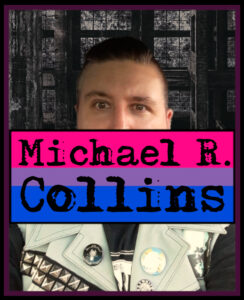A Point of Pride: Interview with Michael R. Collins


Michael R Collins was born at a very young age in the wilds of southern Idaho. After a few decades, he finally got his fill of all the sagebrush and rattlesnakes he could eat, so he struck out into the world. After slinging some bass guitar and general shenanigans in Austin, Texas, he currently lives in Pennsylvania with his partner Mel. He is a Bi author who has published four novels. His most recent novellas are Verum Malum, Miracles for Masochists (with James G. Carlson), and Dick Wiggler and Other Useless Superpowers (writing as Mick Collins) as well as penning a few alibis. (Just in case.)
He is one of the co-hosts of the Bi+ Podcast.
What inspired you to start writing?
I always had stories going on in my head. If I wasn’t reading, I was daydreaming, living life a million miles away. As a teenager, my aunt admitted to writing a romance novel, and it struck me that I could write, too. To put what was in my head on paper and maybe someone would be interested in joining in the fun of my imagination. So, I sat down and started typing and haven’t stopped since.
What was it about the horror genre that drew you to it?
Horror always fascinated me. The dark and creepy always felt a little at home. The genre is so expansive and keeps growing, so it’s hard to get bored with it. A person can be as subtle or extravagant as they want. I feel that horror is a fertile field for metaphors and I love that about it. Sometimes a monster is just a monster, and sometimes it is so much more.
Do you make a conscious effort to include LGBTQ material in your writing, and if so, what do you want to portray?
I do try to have representation as much as possible. I think it’s important because we have not seen the community portrayed as much, or as honestly, in the past. Most of what I attempt to do with LGBTQ material is just to have us exist in the story as three-dimensionally as we exist in real life. I want to portray that we are as strong, weak, funny, angry, or real as anybody else. I also try to highlight our diversity, and that diversity is what makes us strongest.
What has writing horror taught you about the world and yourself?
Horror has taught me that darkness doesn’t always mean an absence of light. Sometimes that darkness can reveal more than the light. I find that very uplifting because there are things we don’t want to see, but should.
For myself, it helped me deal with my own mental health issues. It’s taught me I can expand my horizons farther than I thought possible, and the only limits are the ones I put on myself. Horror has also shown me that I can be comfortable in community and that I belong.
How have you seen the horror genre change over the years? And how do you think it will continue to evolve?
As with all things, it has expanded and contracted. Overall, the genre has grown in both depth and interest. New territories have been discovered. Worn-out old tropes have been revitalized. I see much of the same continuing in the future. The genre will keep getting more diverse and open. I also think horror will get the consideration it deserves, dealing with serious issues and making bold statements, and seen less and less as just a “thrill.”
How do you feel the LGBTQ community has been represented thus far in the genre, and what hopes do you have for representation in the genre going forward?
Representation has been spotty at best in the past. The trope of the expendable queer or the comedy relief is old hat, as is the obligatory gay villain. But thankfully we’re seeing less and less negative stereotypes. Not only are we having more positive representation, we’re seeing more LGBTQ writers driving that representation. I hope to see more of us out there as readers, writers, and appreciators of the genre. I hope to see non-LGBTQ writers reaching out to us and making sure they are depicting us honestly if they include our community in their works.
Who are some of your favorite LGBTQ characters in horror?
That’s a tough question. I generally don’t think of things in terms of favorites. I guess to throw out a classic character I’ve always liked is Dracula. Not explicitly queer, but I always read him that way, even from the first time I read the story at 12 years old.
A more recent one is Dani by Angelique Jordonna. A very complex and approachable character and intensely engaging story.
Who are some LGBTQ horror authors you recommend our audience check out?
Hoo boy! That’s a list. Lol. Here are a few: Angelique Jordonna, Ruth Anna Evans, Judith Sonnet, Hailey Piper, Anton Cancre, James Lefebure, Jason Nickey, and of course, Sumiko Saulson.
What is one piece of advice you would give horror authors today?
Be willing to take a chance. As the genre expands and grows, be willing to grow with it. Even if you have an established niche, readers want to see where you will take that niche. Sometimes, stepping out of our comfort zones can turn out to be a lot of fun. Plus, it keeps the readers on their toes.
And to the LGBTQ writers out there who are just getting started, what advice would you give them?
Go forth and conquer! We need more LGBTQ voices out there. We need more of a presence in the genre. I say don’t be afraid to scare and disturb the masses. Keep writing and keep honing your craft. This is our art.



